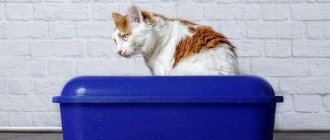Raising a pet, especially a cat, is not as easy as most people think. If treated poorly, your loved one can suffer seriously from indigestion and even cancer. One of the most common phenomena is bleeding during bowel movements.
Blood spots in kittens' stool can come as a shock, but there are a few things you can do to improve the situation. A good understanding of the possible causes and effective medical care, including first aid, will likely be helpful.
Categories of blood in kitten stool
Fecal bleeding usually comes in two main forms, depending on the various sources of disease:
- Hematochezia
Hematochezia, commonly known as bright red blood, is associated with bleeding in the lower intestine, namely the colon and rectum. No case of hematochezia should be taken to heart. However, recurrence of this phenomenon may indicate all the signs of serious health problems, including cancer and parasite infestation in old and young animals, respectively.
© shutterstock
- Melena
Melena, or tarry blood, occurs due to damage in the intestinal tract, especially in the small intestine, where the blood is subject to discoloration as a result of the digestive process due to the action of enzymes found there. This bleeding often occurs in cats' stomach, esophagus, duodenum and, in some cases, the mouth and nose.
Warning signs and symptoms
When cleaning up the pet's potty, the owner may discover that there are several drops of blood on the feces, or that the entire mass of feces is colored reddish. Let us note right away that this is not normal, and such a signal indicates that the animal needs increased observation and attention from humans.
If blood was detected in the stool of a furry pet once, the symptom did not recur again, and the general condition of the animal is assessed as good (that is, the pet is cheerful, cheerful, eats, actively responds to affection), there is no need to worry. Most likely, there was a one-time injury to the animal’s rectum (for example, the mucous membrane could have been scratched by a sharp piece of undigested food or a small foreign object that came out naturally).
The general condition of the cat is an indicator of health
If blood appears in the stool again and again, you need to find out the reason for its appearance immediately. In a situation where bloody spots in the animal’s feces are accompanied by such manifestations as lethargy or lethargy of the pet, diarrhea or constipation, refusal to eat, increased or decreased body temperature (the norm for an adult cat is within 38-39 degrees), you need to take the pet to the clinic immediately.
The severity of the problem at the initial stage can be assessed by the owner himself. You need to make an appointment at the veterinary clinic on the same day if your cat has the following problems:
- The bleeding is profuse (not streaks or droplets, but whole puddles).
- Blood flows from the anus even when not having a bowel movement.
- The animal screams on the potty, showing pain.
- The cat is vomiting.
If the cat wants to go to the toilet, but cannot, the problem requires the intervention of a doctor.
It is not at all necessary (and even impossible) that all of these symptoms will appear simultaneously. The manifestation of at least one of them, together with the blood that appears in the tray, is enough to show the pet to a qualified veterinarian. It is worth remembering that bleeding from the anus can cause the death of a cat quite quickly!
Important! If the listed symptoms are observed not in an adult animal, but in a kitten, you need to act very quickly. Due to the kitten’s fragile body and shaky immunity, the signs mentioned above can become fatal.
Apathy and refusal to eat are the first alarming symptoms
Causes of blood in kitten stool
- Colitis
Inflammation of the colon, or colitis, is the most common factor leading to blood in the stool of kittens. Sometimes it is difficult to determine the cause of inflammation, but it is somehow related to gastrointestinal disorders.
In the case of colitis, inflammation causes colon cells to shed, causing the intestinal lining to become permeable to water and secretions. Consequently, it has a major effect on intestinal motility and the colon's ability to absorb water and store feces. Because food passes through the colon without the body retaining many nutrients and water, symptoms of diarrhea and signs of blood and mucus usually follow.
Due to rapid dehydration, kittens infected with colitis will defecate frequently, but without large amounts of stool.
- Inflammatory bowel disease (IBD)
Inflammatory bowel disease causes inflammation of the cells of the gastrointestinal tract at a chronic level, leading to damage to the lining of various areas, including the small intestine, colon and stomach. Although no one is entirely sure of its exact origins, IBD is thought to result from food intolerances, gut bacteria, and damage to the immune system.
Unlike colitis, the inflammatory processes caused by IBD do not go away over time, but require immediate treatment. Poor digestion, nutrient absorption, and abdominal distress are just three common effects of IBD in the short term. Over time, patients may suffer from scarring of the lining, which in turn stimulates the growth of colon cancer cells.
- Parasites
Your cat is at high risk of contracting various parasites through the mouth. In kittens, roundworms most likely enter cats' bodies through a source of contaminated mother's milk. Likewise, adult cats take so long to absorb parasites when they eat rodents or infected animals. These worms have been proven to cause serious consequences if patients do not receive immediate treatment, which can lead to pneumonia, intestinal obstruction and even death. In less severe cases, cats may suffer from vomiting, bloody stools, coughing, vomiting and diarrhea.
Protozoal infection is also a source of concern because when they invade the body, these single-celled parasites can cause a range of gastrointestinal problems, from soft stools to vomiting and diarrhea. Cats can become infected with giardiasis directly or indirectly through contact with contaminated soil or food sources.
- Constipation
Typically, a healthy kitten will go to the litter box at least once a day. If he misses a few days or has a small bowel movement when he strains a lot, he may be diagnosed as constipated.
The type of fecal bleeding can be attributed to difficulties with bowel movements. Undoubtedly, irritation and small tears in the intestines are easily triggered when hard, dry bowel movements are combined with constipation.
- Viral infection
Without proper vaccinations, kittens easily fall victim to feline panleukopenia, a disease caused by parvovirus that can remain very active in shelters, boarding facilities and kennels for such a long time.
In particular, kittens whose immune systems are not fully developed are susceptible to diarrhea, high fever and even death when infected with this type of virus.
- Injuries
Bright red blood may appear as a result of injury to the anus. This often happens when outdoor kittens get into a fight that causes their pelvic bones to break, or during a medical exam such as probing, enema, etc.
- External factors
Kittens can have a strong reaction to strange foods when first introduced, which often puts pressure on their intestines and then leads to bleeding. Generally speaking, your pets should never be fed human food, especially dairy products.
Warm milk is commonly mistaken for cats' favorite drink, but kittens are actually very allergic to lactose. Some foods, namely boiled potatoes and boiled chicken, may be acceptable to their digestive system.
Hard objects, such as bones or hair, lodged in a cat's intestines can irritate the lining of the colon, which can also lead to blood in the stool.
© shutterstock
Diagnostics and first aid
If your cat poops blood, don’t hesitate. Only after a comprehensive examination is it possible to draw up an accurate treatment plan, so it is important to turn to professionals. Before contacting the clinic, the owner of the animal should carefully observe the cat in order to describe the clinical picture and symptoms as accurately as possible before visiting the veterinarian.
The history must indicate the frequency of bowel movements in the animal and how many times blood fractions were present in the feces. It is also important to consider whether the feces contained blood and mucus, or whether there were undigested food particles. Perhaps the blood was released in the form of drops or clots.
The behavior of the animal during the act of defecation also matters. If during the act of defecation the pet screams and tenses, this may indicate constipation or a tumor that interferes with the normal passage of feces.
It is also necessary to note the accompanying symptoms - the presence of vomiting, refusal to eat, diarrhea, thirst or refusal of water. The appearance of bloody diarrhea in a pregnant cat is often accompanied by an increase in body temperature, a sharp decrease in activity, vomiting and apathy.
Referring to the data received from the animal owner, as well as after a clinical examination, the veterinarian prescribes additional diagnostic methods to determine the cause of the appearance of blood in the cat’s feces. In all cases, diagnosis includes:
- conducting a general blood test;
- blood from a vein for biochemistry;
- coprogram (necessary for analyzing the properties of feces of physical and chemical types).
Additional diagnostic methods are:
- ultrasound examination of the abdominal organs;
- colonoscopy (required if there is a suspicion of obstruction of the large intestine, the presence of polyps or tumors);
- urine analysis;
- allergy tests (if food allergies are suspected);
- X-ray of the abdominal organs.
Based on the results of the research, a qualified doctor develops a treatment regimen, taking into account the individual characteristics of the animal and the complexity of the pathological process.
Natural Home Remedies
If blood is found in your kitten's stool one day and he is still eating and playing as usual, you shouldn't worry so much. Perhaps the root cause is a slight gastrointestinal upset due to overeating or eating someone else's food. Moreover, some cats' digestive systems are easily irritated by stress or sudden environmental changes. These include introducing a new pet into the home, giving birth, and changing your daily diet. Cats often need time to adapt to new brands of food to avoid acute complications.
In this case, try to keep the kitten away from food for at least 24 hours, but it is okay to give him fresh water. This way, his body will only be able to cope with the culprits in the digestive system, instead of taking in new foods. After this, your cat should be fed boiled rice, skinless chicken and plain yogurt to soothe the digestive system. It is also recommended to use a natural diet without additives or preservatives to keep your cat in shape.
You also want your cat to feel at ease. The more stressed a cat is, the more likely she is to develop colitis. Try to minimize changes to his daily routine, such as moving house or any new members moving in.
The bowel movement is normal
Normally, the process of defecation ensures the removal of toxic substances and unnecessary metabolites from the body. A cat should poop on average once a day; changes up or down are pathological. In this case, the poop should have a formed appearance, liquid or solid form of the stool also indicates any violations.
The main condition for the normal process of defecation is the absence of pathological impurities in the stool. This applies to mucus, pus and blood. Bloody stool indicates pathological changes and requires immediate medical intervention.
Professional intervention
On the other hand, if there are repeated sightings of blood accompanied by diarrhea or vomiting, your kitten may be facing a serious health problem that requires immediate veterinary attention. Bring a stool sample to your local veterinary clinic and your veterinarian can perform a series of tests, including an ultrasound, urine test, and abdominal x-ray to find out the real problem.
Based on an accurate diagnosis, it is expected that prescribing antibiotics will help eliminate bacterial infections. If your cat has parasites, deworming may be recommended. Additionally, natural supplements such as slippery elm extract may help your cat, but be sure to consult with your veterinarian before trying it. This is because some cats may develop allergic reactions to natural ingredients. At the same time, you should strictly follow your veterinarian's recommendations for a special diet for your cat in order to achieve the most desirable results in the recovery process.
Finally, closely monitor every change in his behavior day by day to see whether his health is improving or not. Contact your veterinarian immediately if the situation worsens and take immediate action.
Making a diagnosis if your cat has bloody diarrhea
To determine the main reason that caused bloody diarrhea in a cat, a veterinarian must examine the animal and collect history data - how the animal behaves, what it has eaten recently, whether there have been any special situations or stress. Lab tests
and
examinations
will help diagnose all the features of the disease, its severity and the magnitude of intestinal inflammation.
An indispensable method will be radiology using a contrast agent , which will help identify the presence of foreign objects, tumors, and damage to the intestinal walls .
Suspecting helminthic diseases, the doctor will prescribe a stool examination.
The veterinarian should also check the cat for infection.
bacterial, viral infections, toxoplasma and other protozoan parasites.










